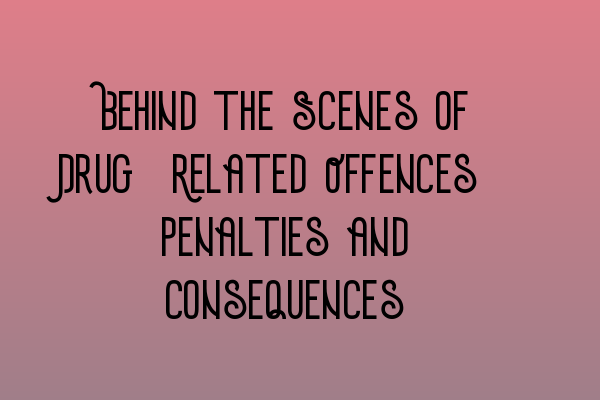Behind the Scenes of Drug-Related Offences: Penalties and Consequences
Drug-related offences are a serious matter in the criminal justice system, and understanding the penalties and consequences involved is crucial. As a leading law firm specializing in criminal law, we at SQE Criminal Law & Practice Law UK are committed to providing you with the necessary information about drug-related offences.
Understanding Drug-Related Offences
Drug-related offences encompass a wide range of illegal activities involving controlled substances. These offences can vary from possession and distribution to manufacturing and trafficking of drugs. The severity of penalties can depend on factors such as the type and quantity of drugs involved, as well as the intent and previous convictions of the offender.
When it comes to drug-related offences, being aware of the penalties and consequences is essential for both defendants and their legal representatives. By understanding the intricacies of the law, defendants can make informed decisions about their legal strategy, while solicitors can provide the best possible advice and representation.
Penalties for Drug-Related Offences
The penalties for drug-related offences in the UK can be severe. In many cases, they include imprisonment, hefty fines, and the possibility of asset forfeiture. The specific penalties can vary depending on the classification of the drug under the Misuse of Drugs Act.
Class A drugs, such as heroin and cocaine, carry the harshest penalties. Offences involving Class A drugs can lead to lengthy prison terms, ranging from several years to life imprisonment. The fines imposed can also be substantial, often in the tens of thousands of pounds.
Class B drugs, including cannabis and amphetamines, carry lesser penalties than Class A drugs but are still serious offences. Offenders can face imprisonment for up to 14 years, along with significant fines.
Class C drugs, such as anabolic steroids and GHB, generally carry the lowest penalties among the three classes. However, it is important to note that these penalties can still result in imprisonment for up to two years and substantial fines.
Consequences of Drug-Related Offences
Drug-related offences can have far-reaching consequences beyond the immediate penalties imposed by the courts. Convictions for drug-related offences can lead to long-lasting effects on an individual’s personal and professional life.
Having a drug-related offence on your record can hinder employment prospects, as many employers conduct background checks and may be reluctant to hire individuals with criminal records. Additionally, drug convictions can impact the ability to obtain visas and travel internationally.
Moreover, drug-related offences can strain personal relationships and cause emotional distress. The stigma associated with drug use and involvement in illegal activities can lead to isolation and social exclusion.
Seeking Legal Guidance
If you or someone you know is facing drug-related charges, it is crucial to seek legal guidance from experienced solicitors who specialize in criminal law. At SQE Criminal Law & Practice Law UK, our team of dedicated professionals can provide comprehensive legal support and representation throughout the legal process.
By working with a skilled solicitor, you can navigate the complexities of drug-related offences, understand the potential penalties and consequences, and build a strong defence strategy. Our expertise and knowledge of the law can make a significant difference in the outcome of your case.
If you require further assistance or want to learn more about SQE criminal law courses, feel free to contact us. We also provide SQE 1 Practice Exam Questions, SQE 1 Practice Mocks FLK1 FLK2, SQE 2 Preparation Courses, SQE 1 Preparation Courses, and SRA SQE Exam Dates for aspiring legal professionals.
Remember, being informed about drug-related offences and seeking guidance from legal experts is the first step towards protecting your rights and achieving the best possible outcome in your case.
